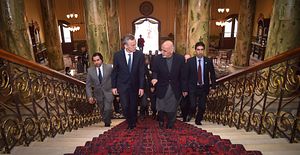Tuesday, Special Representative of the Secretary-General for Afghanistan Nicholas Haysom briefed the UN Security Council on Afghanistan. He launched his remarks by noting that the country is “being as severely tested as it was in 2015.” Afghanistan, Haysom said, faces several challenges: “a contracting economy characterized by low growth and high unemployment; an intensifying insurgency regarded by some as an eroding stalemate; and an increasingly fractious and divided political environment.” Most importantly, he said, is progress toward peace: “Afghans want peace; they deserve peace; but most importantly they need peace.”
To make matters more stressful, because of Afghanistan’s immense reliance on foreign aid and support, the country’s future finances are undetermined–and with its finances unclear, so is the potential for stability. This year, at conferences in Warsaw and Brussels, the international community will once again confront the massive military and fiscal needs of Afghanistan.
NATO Secretary General Jens Stoltenberg, in a joint news conference on March 15 with Afghan President Ashraf Ghani, said that although the alliance’s combat mission had ended, it continued to support the Afghan forces through its train, advise, and assist mission–Resolute Support–as well as with financial support. Stoltenberg said that decisions on the future of NATO’s mission in Afghanistan would be made as the July Warsaw summit approached. As Phillip Walter Wellman noted for Stars and Stripes, “The July summit will focus on securing financial contributions to support Afghan security forces and troop contributions until 2020. The alliance now has commitment from members until 2017.”
In Brussels this coming October, the European Union will host the international community and similarly confront the issue of providing ongoing financial support to Afghanistan through 2020.
Haysom called these pending decisions “critical” as Afghanistan relies “on external funding sources for 69 percent of government expenditures.”
In his remarks, Haysom acknowledged “that there was a failure to appreciate the shock [on Afghanistan’s economy] of the withdrawal of the international community at the end of 2014.” Decisions were made based on the assumption that the country would continue to experience 8 percent growth and successfully exploit its mineral resources. “It is now clear, however, that neither would occur,” Haysom said.
But even after noting that previous assumptions bear little resemblance to current realities, Haysom struck an optimistic tone regarding reform measures and regional economic integration schemes:
The Government’s engagement with its neighbors, bilaterally and through initiatives such as the Heart of Asia process and RECCA, for the purpose of regional economic integration, has begun to bear fruit, inter alia, with the launch of the TAPI project. These are encouraging but only first steps in a long road towards self-reliance.
The Turkmenistan-Afghanistan-Pakistan-India (TAPI) gas pipeline might not, in actuality, be the best project to base prognostications of progress on. Although construction has technically begun in Turkmenistan, many details are shrouded by that country’s opaque politics. Then there’s the overarching question of whether it is possible to construct such a massive pipeline through an active warzone.
Haysom and Stoltenberg both had praise for the Afghan security forces, which have had a difficult first year running point on combat operations. According to TOLOnews, Haysom noted that the Taliban expanded its reach, temporarily capturing 24 district centers in addition to the brief but pivotal seizure of Kunduz, a provincial capital, last October. “This represents a significant increase compared with 2014,” he said “when the Taliban captured only three centers. Even though most district centers were quickly retaken by pro-government forces, several remained under Taliban control for weeks.”
Looking ahead, it’s clear Afghanistan still needs international support but what isn’t clear is how much the international community can maintain the will to keep propping up the Afghan state.

































